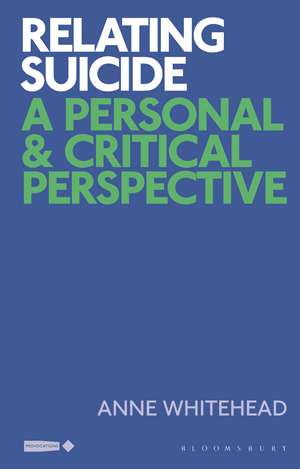Relating Suicide: A Personal and Critical Perspective: Critical Interventions in the Medical and Health Humanities
Autor Anne Whiteheaden Limba Engleză Paperback – 8 feb 2023
| Toate formatele și edițiile | Preț | Express |
|---|---|---|
| Paperback (1) | 94.04 lei 3-5 săpt. | +15.40 lei 7-13 zile |
| Bloomsbury Publishing – 8 feb 2023 | 94.04 lei 3-5 săpt. | +15.40 lei 7-13 zile |
| Hardback (1) | 301.41 lei 6-8 săpt. | |
| Bloomsbury Publishing – 8 feb 2023 | 301.41 lei 6-8 săpt. |
Preț: 94.04 lei
Preț vechi: 107.92 lei
-13% Nou
Puncte Express: 141
Preț estimativ în valută:
17.100€ • 18.68$ • 15.01£
17.100€ • 18.68$ • 15.01£
Carte disponibilă
Livrare economică 01-15 martie
Livrare express 15-21 februarie pentru 25.39 lei
Preluare comenzi: 021 569.72.76
Specificații
ISBN-13: 9781350192164
ISBN-10: 1350192163
Pagini: 128
Ilustrații: 5 b/w illus
Dimensiuni: 138 x 216 x 11 mm
Greutate: 0.18 kg
Editura: Bloomsbury Publishing
Colecția Bloomsbury Academic
Seria Critical Interventions in the Medical and Health Humanities
Locul publicării:London, United Kingdom
ISBN-10: 1350192163
Pagini: 128
Ilustrații: 5 b/w illus
Dimensiuni: 138 x 216 x 11 mm
Greutate: 0.18 kg
Editura: Bloomsbury Publishing
Colecția Bloomsbury Academic
Seria Critical Interventions in the Medical and Health Humanities
Locul publicării:London, United Kingdom
Caracteristici
Extremely interdisciplinary approach that will be of interest to those working in a variety of areas, including the medical humanities, death studies and critical suicide studies
Notă biografică
Anne Whitehead is Professor in Modern and Contemporary Literature at Newcastle University, UK. She is the author of Trauma Fiction (2004), Memory: New Critical Idiom (2008) and Medicine and Empathy in Contemporary British Fiction (2017) and she was co-editor of The Edinburgh Companion to the Critical Medical Humanities (2016)
Cuprins
Introduction: Why?Chapter 1: When?Chapter 2: How?Chapter 3: Where?Coda: Who?Bibliography
Recenzii
The taboos surrounding suicide run deep. I couldn't speak about my brother's death for over a decade. This poignant book creates a space to challenge and rethink our own perceptions of suicide and mental health - both as individuals, and as a society as a whole.
Weaving personal experience together with extensive research, Relating Suicide bears witness to what it means to live beside suicide. It calls for the need to not only talk more about suicide, but also to listen more to a diversity of voices, and to accommodate for what resides between what we can and cannot know about suicide. This is an absolute must read for students and researchers focusing on the topic of suicide and for those who work in suicide prevention and want to understand suicide in more expansive terms.
With her own sister's death as poignant provocation, Anne Whitehead attends to the materiality of suicide's aftermath and makes a compelling contribution to the emerging field of critical suicide studies. A watch, a coroner's court room, a stretch of seaside beach, a memorial bench become the objects and spaces that allow her to sit with the everyday and ongoing presence of suicide without trying to explain or prevent it. Through deeply felt and creative forms of thinking and writing, Whitehead gently but forcefully forges a path for us to relate to suicide rather than turning away from it.
This is a wonderful book. Entirely original, beautifully written, hugely wide ranging. At last a serious and profound engagement with what comes after suicide: the extraordinary disturbances of time and perception for those remaining; the mundane and often forgotten judicial, religious and cultural processes that have sought to contain and circumscribe an event; the historical and ongoing resonances and effects of stigmatisation. Lyrical, analytic, philosophical and factual, this is also achieves that very difficult feat of being personal without being confessional and of being philosophical and political without relegating the profoundly experiential.
Weaving personal experience together with extensive research, Relating Suicide bears witness to what it means to live beside suicide. It calls for the need to not only talk more about suicide, but also to listen more to a diversity of voices, and to accommodate for what resides between what we can and cannot know about suicide. This is an absolute must read for students and researchers focusing on the topic of suicide and for those who work in suicide prevention and want to understand suicide in more expansive terms.
With her own sister's death as poignant provocation, Anne Whitehead attends to the materiality of suicide's aftermath and makes a compelling contribution to the emerging field of critical suicide studies. A watch, a coroner's court room, a stretch of seaside beach, a memorial bench become the objects and spaces that allow her to sit with the everyday and ongoing presence of suicide without trying to explain or prevent it. Through deeply felt and creative forms of thinking and writing, Whitehead gently but forcefully forges a path for us to relate to suicide rather than turning away from it.
This is a wonderful book. Entirely original, beautifully written, hugely wide ranging. At last a serious and profound engagement with what comes after suicide: the extraordinary disturbances of time and perception for those remaining; the mundane and often forgotten judicial, religious and cultural processes that have sought to contain and circumscribe an event; the historical and ongoing resonances and effects of stigmatisation. Lyrical, analytic, philosophical and factual, this is also achieves that very difficult feat of being personal without being confessional and of being philosophical and political without relegating the profoundly experiential.






